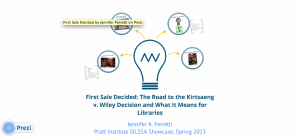If you’ve ever purchased an item at a yard sale, used bookstore, borrowed a book from a library, you’ve expressed your right to first sale. First sale is so deeply rooted in American consumer culture that most people don’t realize this right has been written into Copyright Law. First sale allows a consumer of a lawfully purchased item to keep the item forever, resell it, and gift it. This very right was challenged in the recent Supreme Court case Kirtsaeng v. Wiley (2013).
After realizing Supap Kirtsaeng, an American student from Thailand, was selling Wiley American textbooks that he imported from Thailand, they brought Kirtsaeng to court, stating that he had violated their right of distribution. Kirtsaeng requested family and friends in Thailand send him American textbooks (that were available in Thailand for significantly less money than in America and were also of lesser quality) so that Kirtsaeng could then sell them on eBay. Kirtsaeng tried to use first sale as a defense to this type of alleged copyright infringement, which was argued in the Supreme Court.
Issues that have arisen from the first sale doctrine stem from a phrase found within it: “lawfully made under this title”. The phrase has been interpreted by the U.S. legal system as implying a geographical limitation and as not. The geographical limitation generally gives favor to the creator of a copyrighted work; indicating that the first sale defense can only be used if a work is manufactured within the U.S.
The Supreme Court ruled in Wiley’s favor, stating that the possible outcome of a different ruling would be too great to ignore.
Interpretation of the first sale doctrine is important because it affects secondary markets, lending libraries, and the U.S. economy. If first sale is interpreted with a geographical limitation, libraries would have to cease lending thousands of books that were manufactured overseas, second-hand retail stores would have to close, and companies would be given incentive to manufacture even more goods overseas.
The purpose of this paper is to question Congress’s intent when it wrote the first sale doctrine as well as to determine what the Kirtsaeng (2013) decision means for lending libraries.

